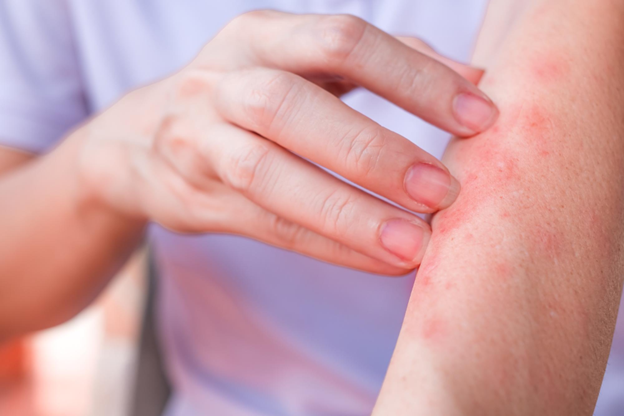Dealing with eczema flare-ups can be distressing, but effective management is possible with the right knowledge. Whether you’re coping with a mild rash or frequent eczema treatment, understanding the basics can help you bring relief to your skin and improve your quality of life. Let’s explore how to manage eczema efficiently.
Understanding Eczema: A Closer Look
Eczema is a common skin condition that causes itchy, inflamed patches on the skin. It can affect individuals differently, from mild itchiness to severe sores. The reason for its prevalence is particularly significant in India due to factors such as climate and population density. Knowing about eczema is crucial as it affects both the individuals’ physical comfort and mental well-being. Equipping oneself with the right information can lead to better handling of this condition and improving day-to-day life.
Diverse Forms of Eczema Unveiled
Eczema isn’t a one-size-fits-all condition; it comes in several types. Getting to know these variations is key to finding the right eczema treatment.
Delving into Different Eczema Types
- Allergic Contact Dermatitis: This type occurs when your skin reacts to a specific allergen. Think metals like nickel, or certain soaps and perfumes.
- Dyshidrotic Eczema: Manifests mainly on fingers, palms, and soles of the feet. It leads to itchy, scaly patches.
- Neurodermatitis: Sometimes resulting from a habit, it entails itching and scratching of a particular area, leading to thickened skin.
- Discoid Eczema: This causes round, coin-shaped spots on the body. It’s different from the typical rash patterns of other eczemas.
- Stasis Dermatitis: Often linked to poor circulation, it appears on lower legs and can cause swelling and redness.
Recognizing Eczema Symptoms Across Age Groups
Eczema symptoms vary significantly between age groups. In infants, it often appears as red patches on the cheeks, whereas children might experience itchy rashes behind the knees or inside elbows. Adults may notice this condition causing dry skin and a recurring itchy rash in different skin areas.
Skin tone also affects how eczema presents itself. On darker skin, eczema might appear lighter or darker rather than just red and inflamed. Understanding these differences can help tailor an appropriate eczema treatment plan that accommodates age and skin tone factors.
Identifying and Conquering Eczema Triggers in India
Recognizing common eczema triggers in India can help in managing symptoms effectively. Let’s look closer at these.
Common Eczema Triggers: Environmental and Lifestyle Factors
Eczema triggers can vary greatly due to environmental and lifestyle factors:
- Irritants: Everyday exposures like soaps, shampoos, or harsh detergents frequently trigger eczema.
- Allergens: Common allergens include house dust mites, pollen, and pet dander.
- Microbes: Certain bacteria and fungi can worsen eczema.
- Climate: The Indian climate, with its hot and humid elements, can be a trigger.
- Dietary habits: Food allergies or sensitivities may worsen eczema. Keeping track of reactions to foods like dairy or nuts is helpful.
- Stress levels: Mental stress can also trigger a flare-up, influencing the body’s inflammation response.
Being sensitive to these factors in daily life enables better management of this skin condition.
Champion Eczema Management: Treatment and Strategies
Adopting a well-rounded approach can significantly ease eczema symptoms and flare-ups.
Expert-Recommended Eczema Treatment Options
Several options exist when it comes to eczema treatment:
- Topical Corticosteroids: These are often prescribed to reduce inflammation and itchiness.
- Oral Medications: Sometimes necessary for severe cases, these help manage your immune system response.
- Over-the-Counter Treatments: Effective options include moisturizers to maintain skin hydration.
- Home Remedies: Taking lukewarm baths and wearing soft, irritation-free fabrics can provide comfort.
These components form a comprehensive approach to dealing with everyday eczema symptoms.
Strategic Nutrition: Eczema Management through Diet
What you eat can significantly impact your eczema management strategy:
- Anti-inflammatory Foods: Foods rich in omega-3 fatty acids, like flaxseeds and walnut oils, can reduce inflammation.
- Indian Cuisine Goodness: Turmeric and ginger, commonly found in Indian kitchens, have natural anti-inflammatory properties.
- Hydration: Ensuring a balanced water intake aids in keeping skin hydrated.
Choosing right from locally available foods not only helps manage flare-ups but also complements medical treatments.
Professional Insights on Chronic Eczema Management
Successfully handling long-term chronic eczema management calls for consistency and perseverance.
Dermatologist’s Perspective on Managing Severe Eczema
When everyday care and remedies fail, seeking professional support becomes essential in chronic eczema management. Dermatologists provide tailored advice, using advanced solutions like phototherapy or immunosuppressants for those who need it.
Don’t hesitate to visit a dermatologist if your eczema condition becomes too challenging. Expert guidance can help in crafting a personalized plan suited to your needs, enhancing your skin health and well-being over the long term.
Schedule a consultation today at Doctor’s Diagnostic Institute for expert guidance!

